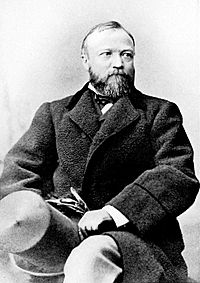Entrepreneur facts for kids

An entrepreneur is a person who organizes a venture to benefit from an opportunity, rather than working as an employee. Entrepreneurs play a key role in any economy. These are the people who have the skills and initiative necessary to anticipate current and future needs and bring good new ideas to market.
Entrepreneurs who prove to be successful in taking on the risks of a startup are rewarded with profits, fame and continued growth opportunities. Those who fail suffer losses and become less important in the markets. Many fail, lose money, and close the business. The entrepreneur assumes all the risks and rewards of the venture and is usually the sole proprietary, a partner or the owner of the majority of shares in an incorporated venture. As the main decision maker the entrepreneur monitors and controls the business activities.
According to Joseph Alois Schumpeter (1883 - 1950) entrepreneurs regard profit as a standard for measuring achievement or success and discovered that they:
- Value self-reliance;
- Strive for distinction through excellence;
- Are highly optimistic;
- Favor challenges of medium risk.
Entrepreneurship is sometimes categorized among the factors of production, along with land/natural resources, labor and capital. An entrepreneur combines these to manufacture goods or provide services. He or she typically creates a business plan, hires labor, acquires resources and financing, and provides leadership and management for the business.
Entrepreneurs commonly face many obstacles when building their companies.
Given the riskiness of a new venture, the acquisition of capital funding is particularly challenging, and many entrepreneurs deal with it via bootstrapping.
While some entrepreneurs are lone players struggling to get small businesses off the ground on a shoestring, others take on partners armed with greater access to capital and other resources.
Definitions of Entrepreneurship
Economists have never had a consistent definition of "entrepreneur" or "entrepreneurship" (the word "entrepreneur" comes from the French verb entreprendre, meaning "to undertake"). Though the concept of an entrepreneur existed and was known for centuries, the classical and neoclassical economists left entrepreneurs out of their formal models:
They assumed that perfect information would be known to fully rational actors, leaving no room for risk-taking or discovery. It wasn't until the middle of the 20th century that economists seriously attempted to incorporate entrepreneurship into their models.
Three thinkers were central to the inclusion of entrepreneurs: Joseph Schumpeter, Frank Knight and Israel Kirzner. Schumpeter suggested that entrepreneurs – not just companies – were responsible for the creation of new things in the search of profit. Knight focused on entrepreneurs as the bearers of uncertainty and believed they were responsible for risk premiums in financial markets. Kirzner thought of entrepreneurship as a process that led to discovery.
Images for kids
-
In 2012, Ambassador-at-Large for Global Women's Issues Melanne Verveer greets participants in an African Women's Entrepreneurship Program at the State Department in Washington, D.C.
-
Malala Yousafzai, a Pakistani activist, social entrepreneur and youngest-ever Nobel Peace Prize winner
-
Apple co-founder and longtime leader Steve Jobs (pictured in 2010) led the introduction of many innovations in the computer, smartphone and digital music industries
See also
 In Spanish: Emprendimiento para niños
In Spanish: Emprendimiento para niños







